
Карл великий называл свое государство "восстановленная империя". Какой смысл он вкладывал в эти
слова?Считаете ли вы его империю новым государством или восстановленным (каким)? 0
0
 0
0
Ответы на вопрос
 Внимание! Ответы на вопросы дают живые люди. Они могут содержать ошибочную информацию, заблуждения, а также ответы могут быть сгенерированы нейросетями. Будьте внимательны. Если вы уверены, что ответ неверный, нажмите кнопку "Пожаловаться" под ответом.
Внимание! Ответы на вопросы дают живые люди. Они могут содержать ошибочную информацию, заблуждения, а также ответы могут быть сгенерированы нейросетями. Будьте внимательны. Если вы уверены, что ответ неверный, нажмите кнопку "Пожаловаться" под ответом.

 0
0
 0
0

Karl the Great and His Empire
Karl the Great, also known as Charlemagne, referred to his state as the "restored empire" or "renovatio imperii" in Latin. He aimed to revive the glory and power of the ancient Roman Empire in his own realm. The term "restored empire" carried several meanings for Karl the Great:
1. Continuity with the Roman Empire: By calling his state a "restored empire," Karl the Great emphasized the connection between his rule and the Roman Empire. He saw himself as the successor to the Roman emperors and sought to establish his authority as a legitimate continuation of the Roman imperial tradition.
2. Christianity and the Church: Karl the Great's empire was closely tied to Christianity and the Catholic Church. By associating his state with the Roman Empire, he emphasized the Christian character of his rule and sought to strengthen the influence of the Church within his realm.
3. Political and Administrative Unity: Karl the Great aimed to create a unified and centralized empire. By invoking the idea of a restored empire, he emphasized the political and administrative unity of his state, which encompassed a vast territory across Western Europe.
4. Cultural and Intellectual Revival: Karl the Great's empire witnessed a revival of learning and culture, often referred to as the Carolingian Renaissance. By aligning his state with the Roman Empire, he sought to promote intellectual and cultural achievements reminiscent of the Roman era.
It is important to note that Karl the Great's empire was not a direct continuation of the Roman Empire, but rather a distinct political entity that drew inspiration from Roman traditions and sought to restore some of its former glory. The term "restored empire" was a symbolic expression of Karl the Great's ambitions and the ideals he sought to embody in his rule.
 0
0
 0
0
Топ вопросов за вчера в категории История
Последние заданные вопросы в категории История
-
Математика
-
Литература
-
Алгебра
-
Русский язык
-
Геометрия
-
Английский язык
-
Химия
-
Физика
-
Биология
-
Другие предметы
-
История
-
Обществознание
-
Окружающий мир
-
География
-
Українська мова
-
Информатика
-
Українська література
-
Қазақ тiлi
-
Экономика
-
Музыка
-
Право
-
Беларуская мова
-
Французский язык
-
Немецкий язык
-
МХК
-
ОБЖ
-
Психология
-
Физкультура и спорт
-
Астрономия
-
Кыргыз тили
-
Оʻzbek tili



















